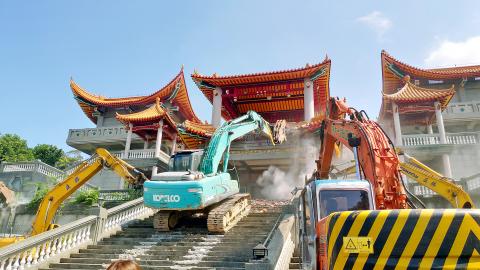The Changhua County Government yesterday demolished a former temple that had been converted into a shrine to the Chinese Communist Party (CCP), while the owner protested by raising aloft the Chinese flag a final time.
Wei Ming-jen (魏明仁), a contractor and former military officer, bought the property and used it as a conduit of Chinese influence and his own interests, an official said Tuesday on condition of anonymity.
The temple was ordered demolished and its water and power supplies cut by the county on Friday last week. Changhua County Deputy Commissioner Lin Ming-yu (林明裕) yesterday oversaw the demolition work, which he ordered to commence at 10:05am.

Photo: Chen Kuan-pei, Taipei Times
The county said Wei would be responsible for paying the NT$5 million (US$162,882) cost for demolition, adding that the work would take one week to complete.
On Tuesday, about 20 people showed up to support Wei, who wore a People’s Liberation Army uniform during the flag raising.
Wei told his supporters that the demolition had historical significance, adding that the communists would “rise up again at their base in Ershuei (二水)” — the township where the property is located.
Wei ended his speech by chanting: “Long live the Chinese Communist Party. Long live the teachings of Mao Zedong [毛澤東]. Long live the People’s Republic of China.”
He said his supporters should trust him, because their “great China dream would one day be revived.”
Before the demolition began, Wei raised the Chinese flag at the temple, gathered his belongs and left, accompanied by members of the pro-unification Concentric Patriotism Association (愛國同心會).
The nearly 100-year-old temple originally served as a place of worship for local Buddhists. The temple had hired Wei to build an expansion, but later lost the building to him due to a property rights dispute.
Wei kicked out the nuns residing at the temple and replaced Buddhist statues with images of Mao, Chinese President Xi Jinping (習近平) and other CCP icons.
The Changhua County Cultural Affairs Bureau said the temple was built in 1922 and expanded in 2002.
The temple had agreed to pay NT$70 million for the expansion, but as the work progressed, Wei increased the cost to NT$90 million, which the temple was unable to afford, the bureau added.
Wei took the case to court, where it was tied up for nearly 10 years.
The Changhua District Court ordered the temple be auctioned off.
Wei’s remodeling of the temple with CCP propaganda and Chinese flags caught media attention, with the New York Times running a feature story on Sept. 19.
The nuns have been forced to live as squatters in a makeshift shack next to the property, the temple priest said, adding that he hopes “everyone can help rebuild the temple someday.”
Democratic Progressive Party (DPP) Changhua County Councilor Hsu Shu-wei (許書維) said he was grateful to Changhua County Commissioner Wei Ming-ku (魏明谷) for taking the lead in having the temple demolished, but added that only in deciding who had the rights to the land would justice be served.
At a news conference yesterday, China’s Taiwan Affairs Office spokesman An Fengshan (安峰山) said: “This clearly demonstrates the DPP’s indulgence of Taiwan-independence activities while it attacks and persecutes Taiwanese who advocate unification.”
Additional reporting by Chung Li-hua

SECURITY: As China is ‘reshaping’ Hong Kong’s population, Taiwan must raise the eligibility threshold for applications from Hong Kongers, Chiu Chui-cheng said When Hong Kong and Macau citizens apply for residency in Taiwan, it would be under a new category that includes a “national security observation period,” Mainland Affairs Council (MAC) Minister Chiu Chui-cheng (邱垂正) said yesterday. President William Lai (賴清德) on March 13 announced 17 strategies to counter China’s aggression toward Taiwan, including incorporating national security considerations into the review process for residency applications from Hong Kong and Macau citizens. The situation in Hong Kong is constantly changing, Chiu said to media yesterday on the sidelines of the Taipei Technology Run hosted by the Taipei Neihu Technology Park Development Association. With

CARROT AND STICK: While unrelenting in its military threats, China attracted nearly 40,000 Taiwanese to over 400 business events last year Nearly 40,000 Taiwanese last year joined industry events in China, such as conferences and trade fairs, supported by the Chinese government, a study showed yesterday, as Beijing ramps up a charm offensive toward Taipei alongside military pressure. China has long taken a carrot-and-stick approach to Taiwan, threatening it with the prospect of military action while reaching out to those it believes are amenable to Beijing’s point of view. Taiwanese security officials are wary of what they see as Beijing’s influence campaigns to sway public opinion after Taipei and Beijing gradually resumed travel links halted by the COVID-19 pandemic, but the scale of

A US Marine Corps regiment equipped with Naval Strike Missiles (NSM) is set to participate in the upcoming Balikatan 25 exercise in the Luzon Strait, marking the system’s first-ever deployment in the Philippines. US and Philippine officials have separately confirmed that the Navy Marine Expeditionary Ship Interdiction System (NMESIS) — the mobile launch platform for the Naval Strike Missile — would take part in the joint exercise. The missiles are being deployed to “a strategic first island chain chokepoint” in the waters between Taiwan proper and the Philippines, US-based Naval News reported. “The Luzon Strait and Bashi Channel represent a critical access

Pope Francis is be laid to rest on Saturday after lying in state for three days in St Peter’s Basilica, where the faithful are expected to flock to pay their respects to history’s first Latin American pontiff. The cardinals met yesterday in the Vatican’s synod hall to chart the next steps before a conclave begins to choose Francis’ successor, as condolences poured in from around the world. According to current norms, the conclave must begin between May 5 and 10. The cardinals set the funeral for Saturday at 10am in St Peter’s Square, to be celebrated by the dean of the College